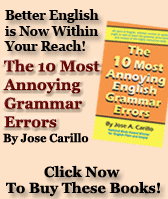- HOME
- ENGLISH FORUM
- BADLY WRITTEN, BADLY SPOKEN
- GETTING
TO KNOW ENGLISH - POUR OUT YOUR MIND IN ENGLISH
- GOING DEEPER INTO ENGLISH
- YOU ASKED ME THIS QUESTION
- EDUCATION AND TEACHING FORUM
- ADVICE AND DISSENT
- MY MEDIA ENGLISH WATCH
- NOTABLE WORKS BY OUR VERY OWN
- ESSAYS BY JOSE CARILLO
- ABOUT JOSE CARILLO
- READINGS ABOUT LANGUAGE
- TIME OUT FROM ENGLISH GRAMMAR
- NEWS AND COMMENTARY
- BOOKSHOP
- ARCHIVES
NEWS AND COMMENTARY
| WORLD NEWS | COUNTRY NEWS |
COMMENTARY | MEDIA RELEASES |
Philippines:
“Thank you, teachers”
By Ernesto F. Herrera, columnist, The Manila Times
Some of the happiest days of my life were spent inside a classroom, first as a student, then as a teacher. Not too many people know that I started out as a teacher before I joined the labor movement, and then much later when I went into politics when Cory Aquino asked me run on her senatorial slate in 1988.
Teaching is very hard work, as any teacher will tell you. One is overworked and underpaid, but the psychic rewards are plenty and almost always worth the effort and sacrifice. I always found a good night’s rest after a day of teaching, perhaps because of the thought that I had done good that day; that, at the very least, one student had learned something from me that would make him a better person.
My teachers were as influential as my parents were to me as a student. Most of them were good teachers who knew their subjects, gave their best and expected the best from their students.
“My Teacher, My Hero”
By Antonio C. Abaya, columnist, The Standard Today
I promised my friend Chito Sobrepeña, chair of the Metrobank Foundation that I would write about a teacher in my grade school, high school or college days who made a difference in my life. And I promised Chito that I would submit it in time for the Foundation’s 2009 Teachers Month campaign to focus the public’s attention on the theme of My Teacher, My Hero.
In my case, it is as clear as sunshine that the teacher who made the most profound difference in my life was Fr. Luis Candelaria, SJ—Fr. Candi—who was my teacher in first year high at the Ateneo de Manila in the school year 1947-48.
To put matters in sharp focus, I should mention that my grade school education came from a mish-mash of different schools of differing standards, made inevitable by the dislocations caused by the outbreak of World War 2, the Japanese Occupation and Liberation by the Americans and Filipino guerillas.
United States:
Rest in Peace, William Safire
By Robert Schlesinger, Thomas Jefferson Street blog
Washington and the nation lost a public treasure Sunday. So, too, did the English language.
William Safire, the former Nixon speechwriter and Pulitzer Prize-winning New York Times columnist, died of cancer Sunday. He was 79.
I met Safire several times over the years, mostly in the company of my late father at meetings of the Judson Welliver Society of former presidential speechwriters, which he stewarded for a quarter century or so. Bill always spoke softly and with the same care and wit evident in his writings.
He was always friendly but I still had some trepidation when I first contacted him after deciding to write a book on the history of presidential speechwriters. Safire was a Washington big dog a couple of times over--first as presidential aide, then as a Times columnist. It would have been easy for him to be too busy to be helpful. But he never lost his humility, his perspective or his appreciation for history, and especially the history of language and its uses.
William Safire—Political lexicographer
By Steven Menashi, Forbes.com
When George Orwell composed his essay "Politics and the English Language" in 1946, William Safire was only 16 years old and studying at the Bronx High School of Science, the last educational institution from which he would graduate. (Safire attended Syracuse University for two years, but dropped out to enter the news business.) Political language, wrote Orwell, had come "to consist largely of euphemism, question-begging and sheer cloudy vagueness."
Safire, who died today at age 79, never ceased identifying and analyzing the creative locutions that entered our political lexicon. Safire left Syracuse to report for The New York Herald Tribune, and thereafter he would become a public relations executive, a speechwriter for President Nixon, a four-time novelist, and—most significantly—a political columnist for The New York Times from 1973 to 2005.
Vatican astronomer: Science and religion are a match made in heaven
By Dan Falk, The Walrus
Installed on the second floor of a small building on the summit of Arizona’s Mount Graham, Guy Consolmagno is multi-tasking. He’s checking email on his laptop and listening to the Penguin Cafe Orchestra on his iPod, all the while keeping an eye on a bank of computer monitors. One floor up, nestled in a silvery-white dome, a telescope is trained on a potato-shaped chunk of rock and ice known as Haumea, which orbits the sun some six billion kilometres from Earth. Thin clouds have been drifting overhead since sundown, but if they dissipate, the telescope’s digital camera will record changes in Haumea’s brightness as it tumbles through the outer reaches of the solar system, offering Consolmagno and fellow astronomers hints about the structure and evolution of our planetary family.
All this is typical fare for a scientist. What is perhaps surprising is that Consolmagno is also a Jesuit brother, that many of his colleagues are ordained priests, and that they’re scanning the heavens with the Vatican Advanced Technology Telescope or, more affectionately, the “Pope scope.”
Finding a job teaching English as a second language on the Internet
If you are fluent in a second language other than English and you can teach it to those who don’t know it, then you have a chance of getting a job teaching English as a second language or related job opportunity.
There are plenty employers that are searching for teachers that are fluent and are qualified to teach English as a second language to those who are not good with the English language. You can qualify if you are a native English speaker and should also possess a Bachelor’s degree in the same field. You should also be able to write well in the English language.
One place where you can get plenty of information about ESL jobs is the internet. You will find a lot of different websites that offer teaching jobs in ESL in the United States and across the world.Turkey:
Three Apples: New language to explain our history
By Paul Chaderjian, Asbarez.com
Once there was and there was not …
Etched somewhere in your memories of childhood must surely be a moment, an image, a fleeting impression, or a moment of you in your yesteryear buying a book or borrowing one from the library.
Etched inexplicably in my memory is this one moment at a bookshop in Damascus, Syria –Cleopatra’s wedding present. This Twilight Zone-ish moment is one of my dad buying three books in English for me, of the polluted stench of spent fuels in the air, the dozens of whizzing scooters feet away, traffic horns, jets flying above, and the buzzing of construction drills above the noises of hawkers and street peddlers.
In that moment and since my earliest memories, there was something special about books. Perhaps it’s a cultural or generational thing, but books were cherished, handled carefully, and were more important than our Matchbox cars and other toys.







